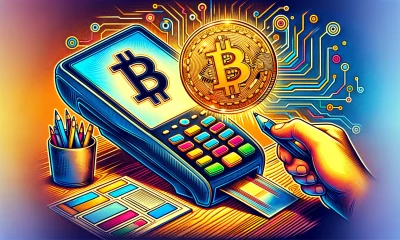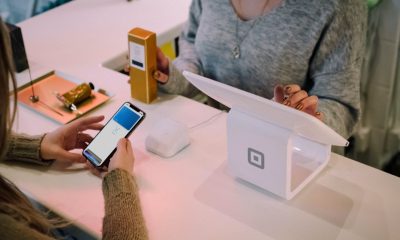Fintech Stocks
Investing in Paypal Holdings, Inc (NASDAQ: PYPL)

By
Baggio MaSecurities.io maintains rigorous editorial standards and may receive compensation from reviewed links. We are not a registered investment adviser and this is not investment advice. Please view our affiliate disclosure.
Table Of Contents

Paypal Holdings, Inc (NASDAQ:PYPL) is known as a leading provider of online payment solutions. Offering an alternative to more traditional payment methods, PayPal came to prominence in the early 2000s as a facilitator of payments for online auction site eBay. Operating out of California in the United States, the company continues to be one of the most innovative companies in the financial technology (fintech) sector. as demonstrated by their recent adoption of cryptocurrency into their ecosystem.
What is Paypal Holdings, Inc (PYPL)?
PayPal was established in 1998 by two individuals with software engineering backgrounds and one lawyer by training. Originally known as Confinity, Max Levchin, Luke Nosek and Peter Thiel's new company was created in order to develop security software for handheld devices. After finding little success in this area, they pivoted their strategy, opting instead to build a digital wallet. This new product was launched almost a year later in late 1999. Soon after, a merger took place between Confinity and X.com, an online bank established by Elon Musk. Although the new firm originally kept the X.com name, they opted to rebrand and clarify their product and service offerings. The company settled on the name PayPal in 2001, and the company eventually went public with an IPO in 2002.
Soon after the IPO, eBay bought PayPal for $1.5 billion. At this time, the company's growth was impressing investors. Over 70% of eBay auctions accepted payments through PayPal, and approximately 25% of closed auctions were using this innovative new payment solution. In just 8 years, PayPal grew to over 100 million users across 190 territories, offering services using 25 different currency options. In September 2014, PayPal opted to split from eBay and focus on other avenues for growth. Although the two continued to work closely together, in early 2018 it was announced that PayPal would cease processing card payments for the online auction site for 2020. Today, PayPal is very much a separate identity from its former owner.
Why does Paypal Holdings, Inc (PYPL) Matter?
Despite coming into existence two decades ago, Paypal's ability to keep up with change has allowed it to remain highly relevant in the modern era. This ability has allowed the company to now serve over 350 million customers and merchants in more than 200 territories. With the goal of making financial services cheaper, more convenient and more secure, they have continued to innovate. In 2019, a partnership with social media giants Instagram saw the launch of Checkout on Instagram, allowing for secure checkouts using the Paypal platform within the application.
An early strategic acquisition came in 2013 when Paypal acquired startup Braintree for $800 million. As part of Braintree's portfolio, Paypal acquired the technology behind Venmo, a mobile service payment app that has now grown to over 40 million users. More recently, the company made another major move, purchasing shopping rewards platform company Honey in a deal worth over $4 billion, their largest takeover to date. Honey is a money-saving tool that is popular among millennials, with over 17 million active users. Paypal states that it plans to further integrate Honey into Paypal and Venmo platforms, allowing the company to further grow its network and attract more merchants.
Paypal made a big splash in 2020 by announcing support for cryptocurrencies within their platform. All users would now be able to buy, hold, and sell cryptocurrencies from their Paypal accounts. This opened up the possibility to make transactions through their platform using popular cryptocurrencies such as Bitcoin and Ethereum, with payments made with crypto being converted into the national currency of the vendor's choice. This adoption will allow for a new and innovative way to make payments to any of the company's 26 million worldwide merchants. Originally offered just in the United States, this service will expand to the Venmo platform and into international markets in 2021. While competitors such as Square's Cash App have already allowed crypto transactions for some time, this move creates an opportunity for one of the largest vendor networks in the world to begin its integration into the cryptocurrency ecosystem.
Paypal Holdings, Inc (PYPL) Prospects
Despite the positive recent announcements and strategic moves, a growing number of competitors are entering the space and could potentially threaten Paypals's position in the sector. Tech companies like Google, Apple, Amazon and Facebook all developing their own payment systems. In anticipation of increased competition, Paypal has put considerable effort into building out core aspects of their business such as Venmo. As a result, the mobile application has have evolved from simple P2P money transfer tools, into a modern, well-rounded financial services application. While peer to peer transfers within the app do not generate revenue, newer features such as Instant Transfers and the Venmo Credit Card are avenues that have been monetized. With a 2019 survey confirming that over 20% of Americans have used Venmo over the past year, there is a clear and present opportunity to leverage the monetization ability of the platform.
Paypal has also looked towards foreign marketplaces with the goal of expanding its user base. In 2019, Paypal acquired GoPay, a payment platform operating in China. The move made Paypal the first foreign payment platform to operate in that country. Although the marketplace in China is dominated by domestic giants such as Alipay, gaining access to one of the largest markets in the world was a step in the right direction. With careful planning and execution, this acquisition has the potential to pay off in a huge way.
Despite this potential competition from giant technology firms, PayPal has been at the top for more than 20 years. Their global network is massive and they remain very well placed to fend off any challenges in the coming years.
Where to Buy Paypal Holdings, Inc (PYPL)
A broker that we recommend is Firstrade.
Firstrade is a leading online brokerage firm offering a full line of investment products and tools designed to help investors like you take control of your financial future. Since its founding in 1985, Firstrade has been committed to providing high value and quality services.
Combining proprietary trading technology, a highly intuitive user interface, outstanding customer service and mobile applications, Firstrade offers a comprehensive solution for all of your investing needs. Firstrade is a member of FINRA/SIPC.
★★★★★ ★★★★★ Firstrade Review Securities.io ratings are determined by our editorial team. The scoring formula for stock brokers takes into account over dozens of factors, including account fees and minimums, trading platforms, customer support, regulatory bodies, and investment options. | ★★★★★ ★★★★★ M1 Finance Review Securities.io ratings are determined by our editorial team. The scoring formula for stock brokers takes into account over dozens of factors, including account fees and minimums, trading platforms, customer support, regulatory bodies, and investment options. | ★★★★★ ★★★★★ Public.com Review Securities.io ratings are determined by our editorial team. The scoring formula for stock brokers takes into account over dozens of factors, including account fees and minimums, trading platforms, customer support, regulatory bodies, and investment options. |
| Open Account | Open Account | Open Account |
FeesZero Commission | FeesZero Commission | FeesZero Commission |
Account MinimumNone | Account Minimum$100 | Account MinimumNone |
PromotionsFree Stocks* *See website for details. | PromotionsNone | PromotionNone |
Summary
As the world continues to move away from more traditional payment methods such as cash and credit cards in favour of e-commerce and digital payments, few companies are in as good of a position as Paypal is to capitalize. The company is continuing to innovate, creating a broad and diverse payments ecosystem that engages both consumers and merchants. Their network is huge and truly global, making it tough for any new entrant to the market to rival them. The company is constantly on the lookout for new avenues to expand into, as is evident by its recent foray into the cryptocurrency space. With the ability to adapt and remain relevant, the future remains bright for Paypal.
Baggio has been an investor in the technology space for over half a decade. He uses the perspectives gained from his work experience in the private, public, and non-profit sectors to guide his investment strategy, with a specific interest in the potential of emerging disruptive technologies.
You may like


Top 10 Bitcoin Payment Processors


Top 10 Financial Technology (Fintech) Stocks to Watch (June 2025)


PayPal to Integrate Ledger Live, and Pause UK Crypto Services


PayPal Enters the Stablecoin Game with PayPal USD (PYUSD)


Institutional Investors Maintain Conviction in Digital-Asset Strategies Despite Heavy Losses


Regulatory Update – Grayscale Prepares to Fight for BTC Spot-ETF, PayPal Receives BitLicense, and more


